Innovative Minds, High-Impact Solutions: How UC San Diego Accelerates MedTech
UC San Diego is a medical innovation powerhouse – and it’s our people who provide that power
Published Date
Article Content
When bioengineering professor Stephanie Fraley, Ph.D. had the idea for a new technology that could saves lives, she knew that the trickiest element would not be the complex science behind her new approach, but bringing it to market so patients everywhere have access to the technology.
While developing a technology to help study how DNA unravels when heated, Fraley identified a way to use the approach to quickly identify the DNA of microorganisms responsible for causing sepsis.
Fraley and her team quickly linked up with one of UC San Diego’s 14 accelerators to bring her idea to market, launched her company, Melio, and joined the ranks of thousands of UC San Diego entrepreneurs who have leveraged the university’s rich entrepreneurial ecosystem and top-tier research enterprise to bring pioneering innovations to the public.
As fourth in the nation for startup creation, according to a 2022 survey by the Association of University Technology Managers, UC San Diego is a national leader in research and innovation where new ideas are regularly translated into societal impact. Across the ten campuses in the University of California system, one in four new inventions originate from UC San Diego.
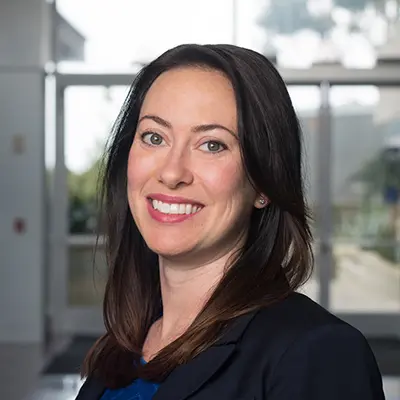
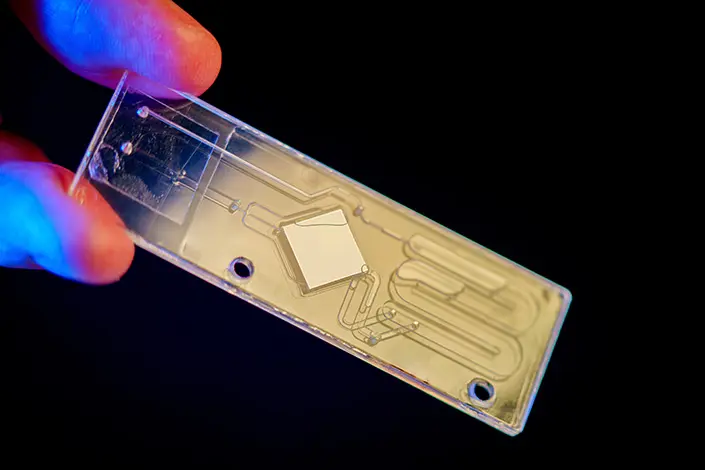
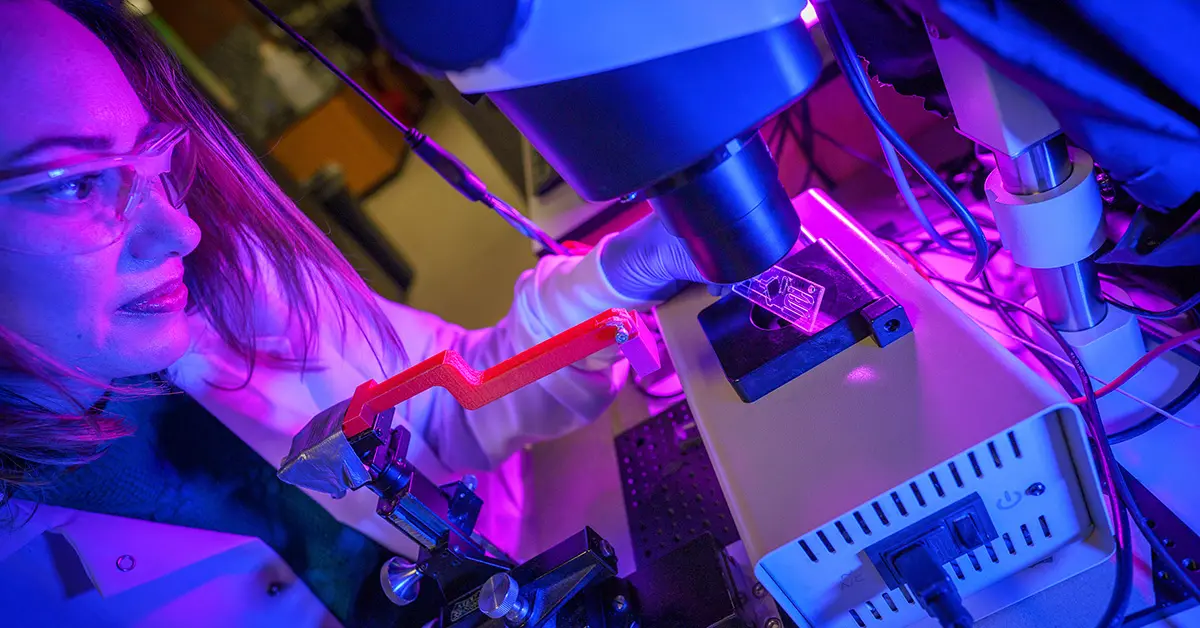
In total, the University has helped launch over a thousand companies. Roughly two thirds of them are in the life sciences, encompassing everything from biotechnology to medical technology (medtech). The latter, loosely defined as any technological innovation that helps better understand, diagnose, or treat a human health condition, comprises about one-third of UC San Diego’s startups.
To support this vast output, the university has set up a robust innovation ecosystem that encompasses dozens of individual offices and programs that help researchers turn their ideas into reality. These include 14 accelerators and incubators and the new Design and Innovation Building, which contains space and resources, including tech transfer support and a 10,000 square foot makerspace, for faculty and students to guide products from design through commercialization.
While space and resources are essential to developing these solutions, UC San Diego has something else going for it that drives its innovation in the medical space: the ability to facilitate multidisciplinary collaborations between faculty from across the campus’ innovation ecosystem. Key to this effort is the Office of Innovation and Commercialization (OIC), which aligns innovation resources at UC San Diego and provides support for researchers at every phase of the commercialization process, from the earliest patent applications to the final product launch.
“As the medical problems we face in society become more complex, new innovations in medicine are crucial for shaping the future of health care. In this intersection of research, entrepreneurship, and societal impact, UC San Diego is a world leader,” said Paul Roben, Ph.D., associate vice chancellor for innovation and commercialization and overseer of the OIC. “Institutions across the country are now emulating what UC San Diego does, because our approach to innovation works, especially when it comes to medicine.”
The MedTech Accelerator: Creating a community of innovators
While there are some three dozen different programs and offices that the OIC helps coordinate, one that has made a particularly strong impact on the medical innovation space is the Institute for the Global Entrepreneur (IGE), a joint effort between UC San Diego’s Jacobs School of Engineering and the Rady School of Management that seeks to inspire and prepare engineers to be entrepreneurial leaders who can fuel the economy and solve problems facing society.
The IGE supports researchers from all disciplines across campus, and its mission translates particularly well to medical inventions, according to Rebecca Deller, program manager for the IGE MedTech Accelerator, a training and mentorship program hosted by the IGE that helps researchers bring medical innovations to market.
“The thing that gets me really excited about the work happening at UC San Diego, particularly in the medical space, is the number of projects that are truly for the greater good,” said Deller. “That’s embedded into the culture we create here.”
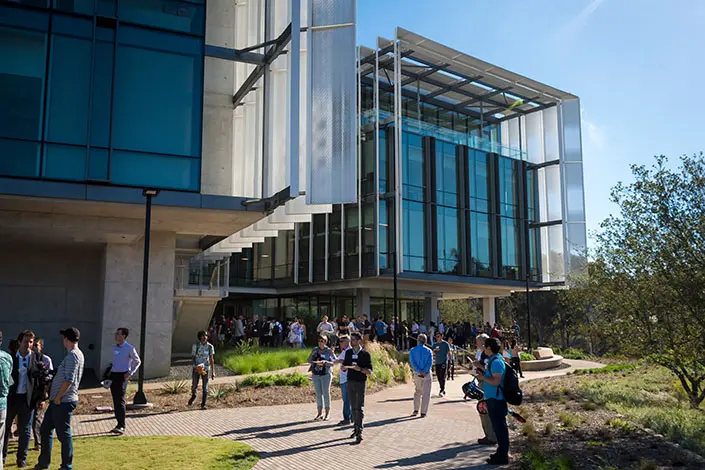
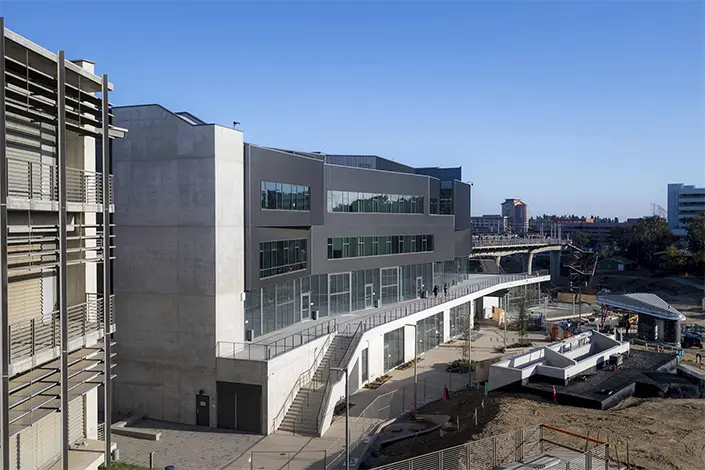
Located on the ground floor of Franklin Antonio Hall, a new engineering building designed to facilitate interdisciplinary collaborations, the IGE MedTech Accelerator is located in the heart of the university’s innovation ecosystem, which Deller says is important to its success.
“We’re here to support anybody that’s doing deep, problem-solving research, and having such a prominent space for our scientists to meet and connect with prospective partners helps us bring ideas from all over the world into the work we’re doing at UC San Diego.”
The MedTech Accelerator program guides scientists and engineers from idea to marketable product in three stages. First, scientists complete a three-month training program that teaches them the ins and outs of the medtech industry and guides them through the earliest strategic phases for their invention, resulting in a draft business plan.
The next phases of the program pair them with experienced mentors that help them develop working prototypes, after which they work to validate their inventions in the clinic. These latter phases of the program don’t follow a strict timeline, allowing inventors to work at their own pace toward a successful product launch.
“People may graduate from our program, but in a lot of ways our alumni never fully leave, because we’re always here to support them and help them make new connections as their companies grow evolve,” added Deller.
Highlights from the MedTech Accelerator
Melio: Out for blood in the fight against sepsis
While Melio is now on the cusp of a successful commercial launch, their flagship pathogen detection system had humble origins in the lab, where it was initially being used to confirm the identity of organisms that had been isolated from clinical samples.
“We began to notice pathogens showing up in our tests that regular clinical tests couldn’t detect at all,” said Fraley, an associate professor in the Shu Chien-Gene Lay Department of Bioengineering at the UC San Diego Jacobs School of Engineering “That’s when we knew we had something unique, because our technology was able to very quickly and inexpensively detect new organisms that aren’t on typical diagnostic panels.”
At this point, around 2017, Fraley and her team were faced with a dilemma: how to turn their promising idea into a clinically viable product. Enrolling in the MedTech Accelerator program helped Fraley and her then-student and current Melio CEO, Mrida Sinha, Ph.D., fill in their missing knowledge and formulate an early business strategy.
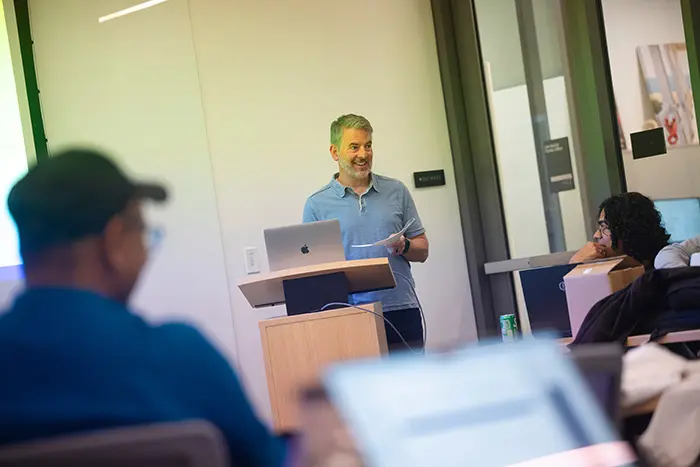
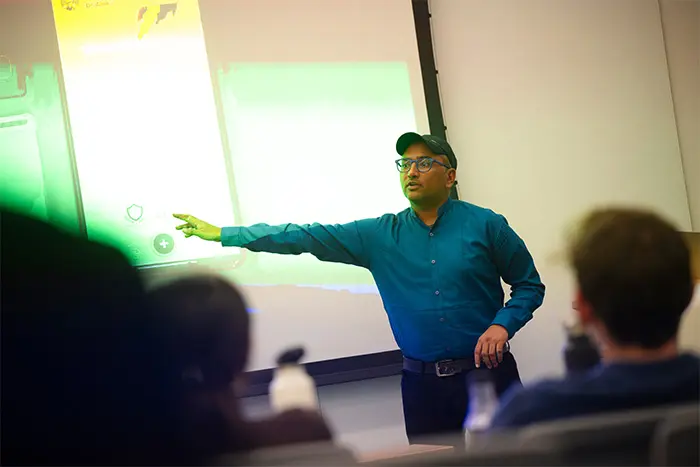
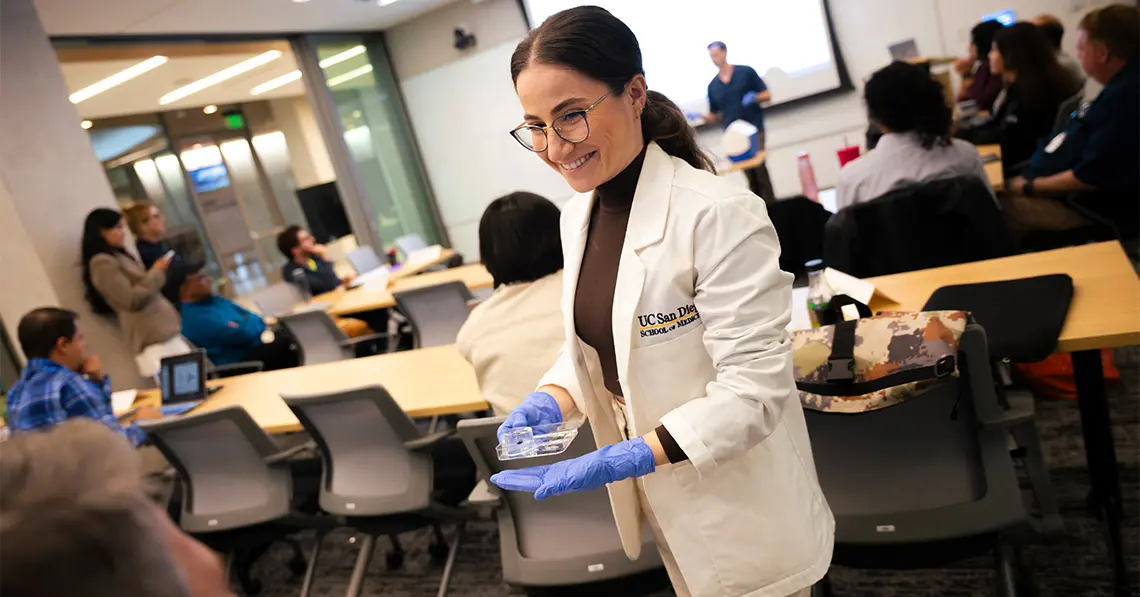
For Fraley, the most valuable lesson she learned through the program was less about what to do, and more about what not to do.
“The professors who are most successful in translating their discoveries into new technologies quickly are the ones that know when to step back and rely on others’ expertise when needed,” she said. “We have been very fortunate to have a lot of great advisors supporting us in the aspects of business development we weren’t familiar with, and the MedTech accelerator has been instrumental in making those connections.”
Since their official launch in 2019, Melio is thriving. Still within Phase 3 of the MedTech accelerator, which focuses on clinically validating the technology, the company recently published the results of two pilot clinical studies testing their sepsis-detection technology in pediatric blood samples and adult bronchoalveolar lavage fluid. They found that their system detected pathogens within 4-6 hours, which was 7.5 hours to about 3 days faster than standard clinical blood culture.
“Long term, we think this could become a universal diagnostic tool that could be lifesaving for people of all ages, not just infants.” said Fraley. We’re grateful for the continued support of the IGE MedTech accelerator in helping us get there."
LIMBER: From classroom project to life-changing medtech
Joshua Pelz, Ph.D., is CEO of LIMBER Prosthetics, a medical startup that launched in 2020 and uses 3-D scanning and printing to make more accessible lower-limb prosthetics. The idea for LIMBER emerged in 2016 when Pelz was a doctoral student in structural engineering at UC San Diego. After seeing a guest lecture in a course on interdisciplinary engineering from ABC/BOC-certified prosthetist and orthotist Herb Barrack, he, Barrack, and his classmate Luca De Vivo Nicoloso, Ph.D., cofounded LIMBER on the idea of using 3-D printing to make prosthetic devices more accessible.
Early on, they knew the technology was promising. What they didn’t know was how to get it to the people who needed it. The MedTech Accelerator was there to bridge the gap. For Pelz, one of the most important new skills was developing a business plan.
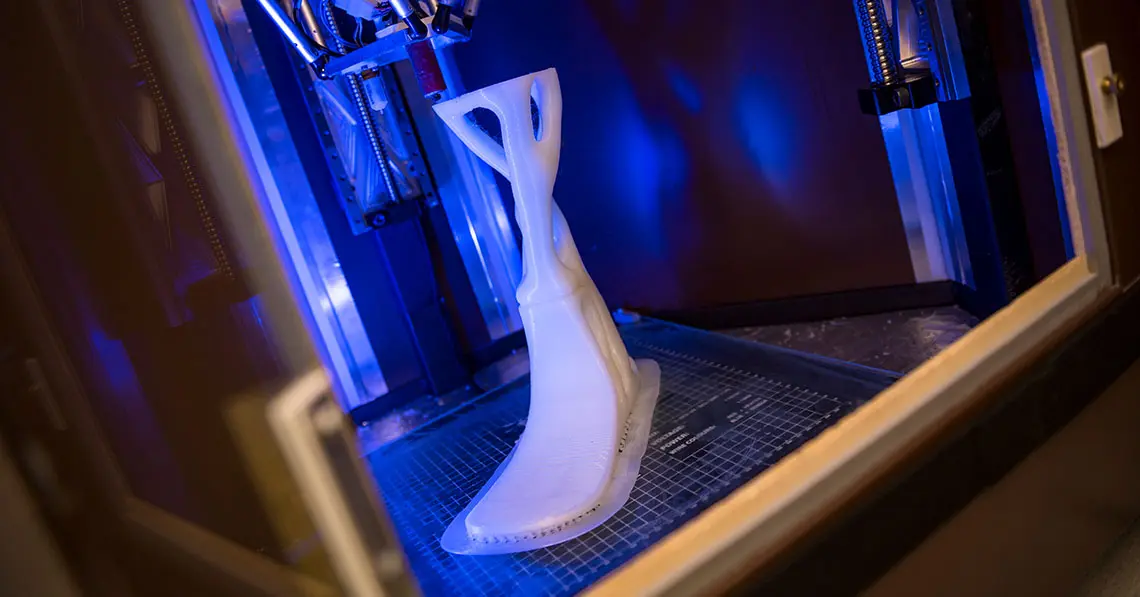
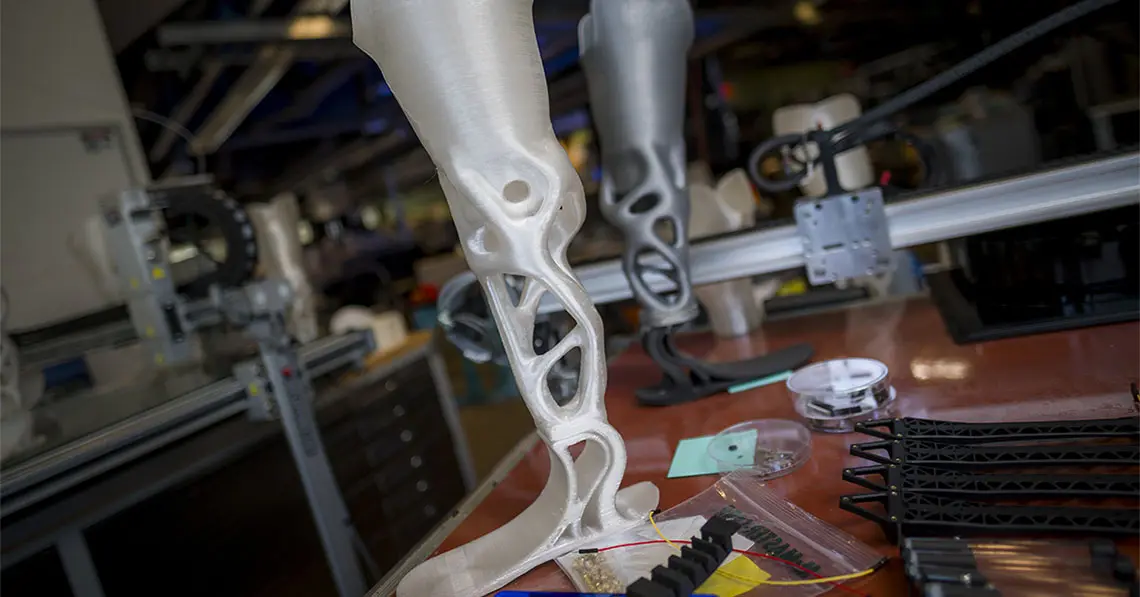
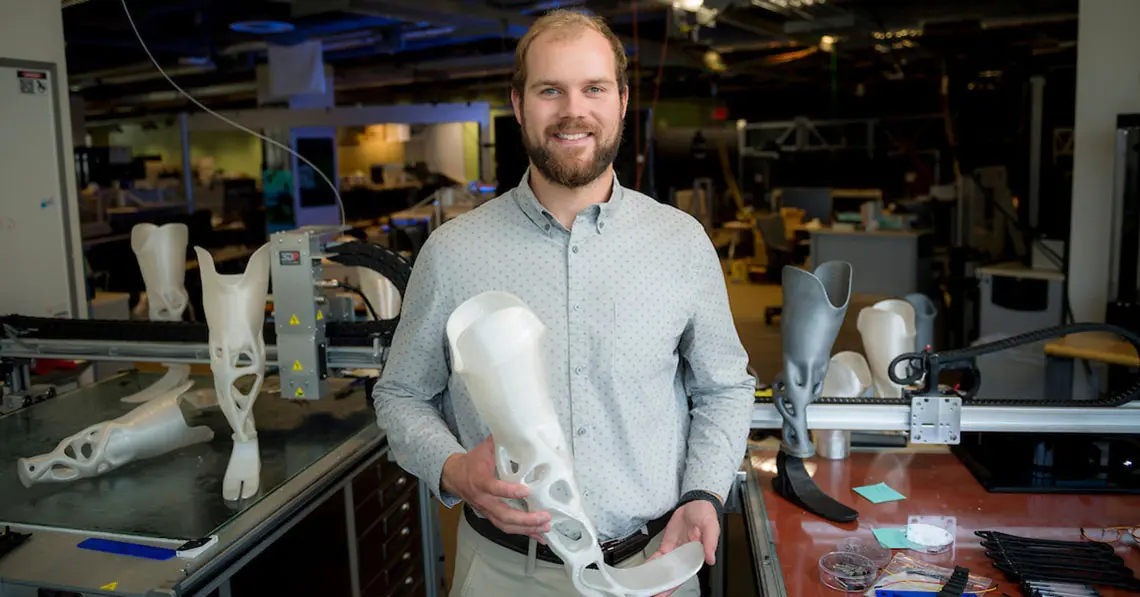
Joshua Pelz is a graduate of the UC San Diego Jacobs School of Engineering and cofounder of LIMBER Prosthetics and Orthotics.
"The IGE created a low-barrier opportunity for us to explore the intricacies of entrepreneurship, something that I knew little about as a scientist and engineer," said Pelz. “We’d all like to think that great technology is enough to change the world, but bringing a product from lab to market requires a sustainable business model and the passion to endure through the difficult times.”
But the business plan was just the beginning for LIMBER. In 2023, after testing their product in Ensenada, Mexico, and securing a top prize at the San Diego Angel Conference, the LIMBER team received a landmark $250,000 seed investment from UC San Diego This marked the first time a UC campus has ever invested in one of its own spinoffs. Thanks to this initial support, which helped the company secure the additional funding needed to grow, LIMBER has now launched their product in the U.S. market.
And while Pelz and his team graduated from Phase 3 of the MedTech Accelerator in 2023, he emphasizes the enduring impact of UC San Diego’s support.
“I no longer have formal ties to UC San Diego as a student myself, but we as a company continue to work with student interns in an academic setting to further our research, and we do a lot of our testing through the University,” said Pelz. “This is a one-of-a-kind institution, and I’ve made it a point to keep those relationship strong because there’s still so much to be gained from our partnership.”
Share This:
You May Also Like
Stay in the Know
Keep up with all the latest from UC San Diego. Subscribe to the newsletter today.



